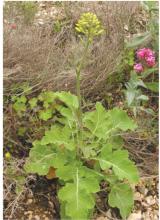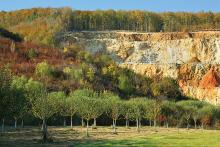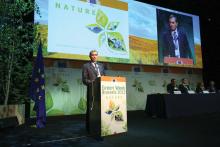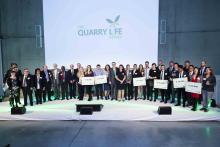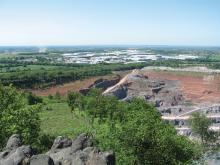Exploitation of a quarry leads to the creation of habitats which have become rare in Belgium, such as cliffs, rocky or sandy surfaces, rock slides, temporary ponds, pioneer and flowered grasslands.
The pioneer habitats, generated by the extractive activity, enable the appearance and development of populations of pioneer species which have high biological value.
The objective of the LIFE in Quarries project is to develop, manage and maintain the hosting capacity of biodiversity of active quarries in Belgium. The originality of the project is to anticipate the implementation of biodiversity management measures during the extracting period in order to maximise stable and biodiversity-rich ecosystems in post-exploitation phase.
Legal interpretation of the temporary nature concept
Because they create habitats attractive to pioneer species through their everyday activities, quarries impact species and habitats protected at regional, and also at the European level.
The project proposes to develop the potential of the quarries in terms of pioneer habitats and thus also enhance the hosting capacity of quarries for, among others, these particular species.
Under the Birds and Habitats Directives and of their regional translation in the Decree on Nature Conservation, quarries are legally bound to ask for derogations when impacts concern protected species or habitats. In this context two extreme options are available for quarry managers:
• To manage biodiversity-rich quarries by intentionally providing conditions for the development of habitats of interest hosting protected species. This option theoretically leads to the obligation of using derogations systematically when the created habitat is impacted by the normal development of the quarries even though the area is integrated to the permitted zone.
• To avoid administrative procedures and potential negative answers, a high level of perturbations is maintained thus discouraging the settlement of protected species, and lowering the biodiversity value of the quarry. Even though this case has become rare in the actual context, some protected species are still seen as “undesirable” in quarries.
LIFE in Quarries aims to propose a method to reconcile the hosting of pioneer nature and the legal constraints. The project will first identify lock-in situations and legal obstacles through a comparative analysis of the current legislation and ways of derogations in Wallonia, and other countries where this thematic has been approached.
The adoption of sustainability agreements will then be promoted between individual quarries and the Walloon authorities responsible of derogations to serve as a legal guarantee in exchange for additional nature efforts.
Towards dynamic management of biodiversity
LIFE in Quarries will demonstrate that operational solutions for biodiversity can be proposed and implemented through limited investments benefiting both stakeholders interested in nature and the private sector.
New approaches will be developed based on a dynamic management of nature where a network of temporary habitats is managed dynamically in time and space across the quarry in parallel with the extractive activity, ensuring a constant availability of suitable habitats for the development of biodiversity.
An innovative project
The project is led by FEDIEX (Federation of Belgian Extractive Industry) in partnership with the Walloon authorities, Natagora (Nature NGO); University of Liege, and PNPE (Public Sector Devoted to Nature Conservation).
This five-year project (2015-2020) is possible with the co-funding from EU’s LIFE programme and the Walloon region.
On site, the actions are implemented using human and material resources from the participating quarries.
In a first phase, the project will develop, test and validate good practices for a selection of Walloon quarries. Once validated, the project will actively demonstrate that the scheme developed during the first phase is transferrable outside of the region’s borders through dissemination of good practices and experiences in quarry sites over several European countries.
International workshops and the establishment of a permanent European Working Group will lead to a constructive dialogue and cooperation with EU stakeholders and promote feedback and dissemination of the project progress in other EU countries.
LIFE programme is the European Union’s financial instrument for environment and climate change. The general objective of the LIFE programme is to contribute to the constant implementation and evolution of environmental and climatic legislation and policies through co-funding projects offering added value at European level.


